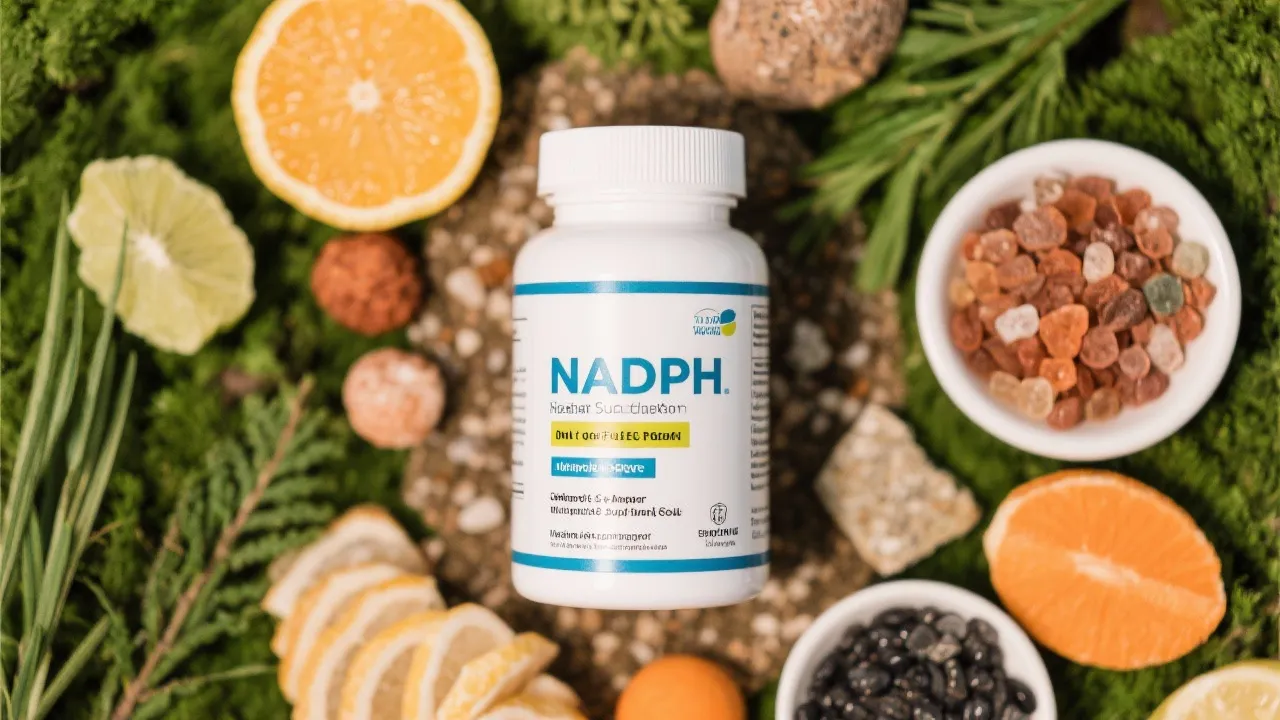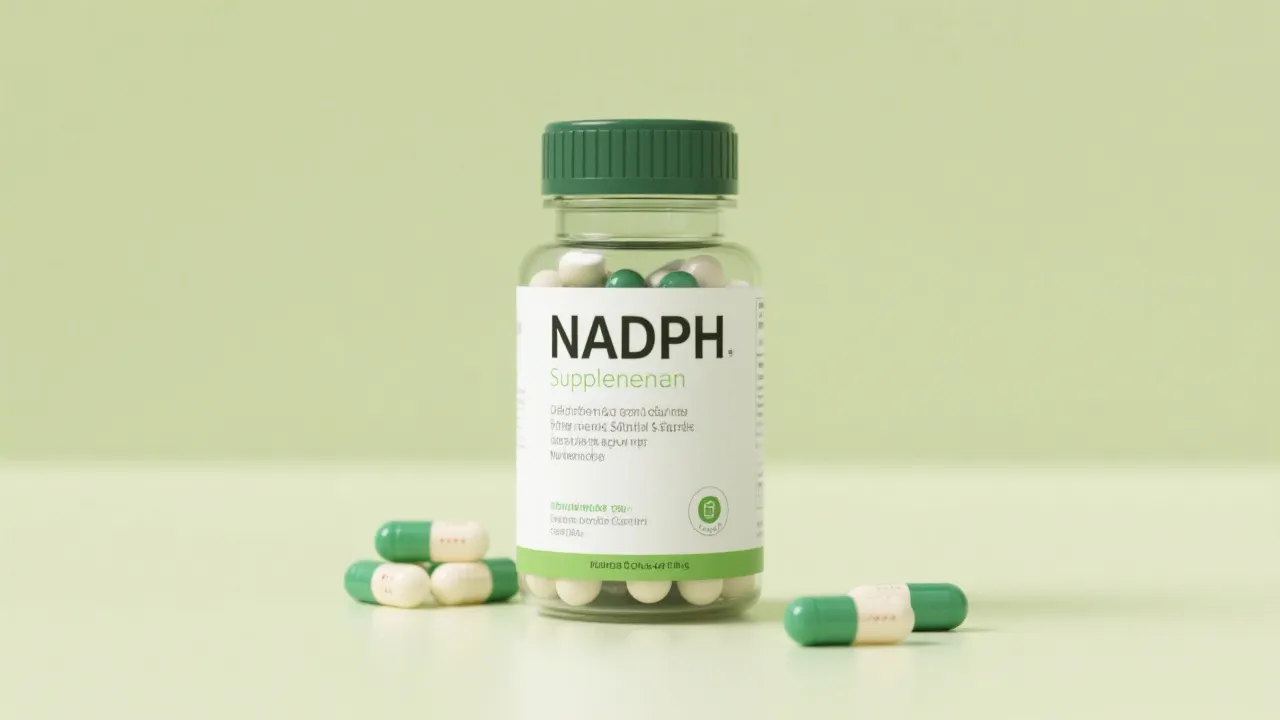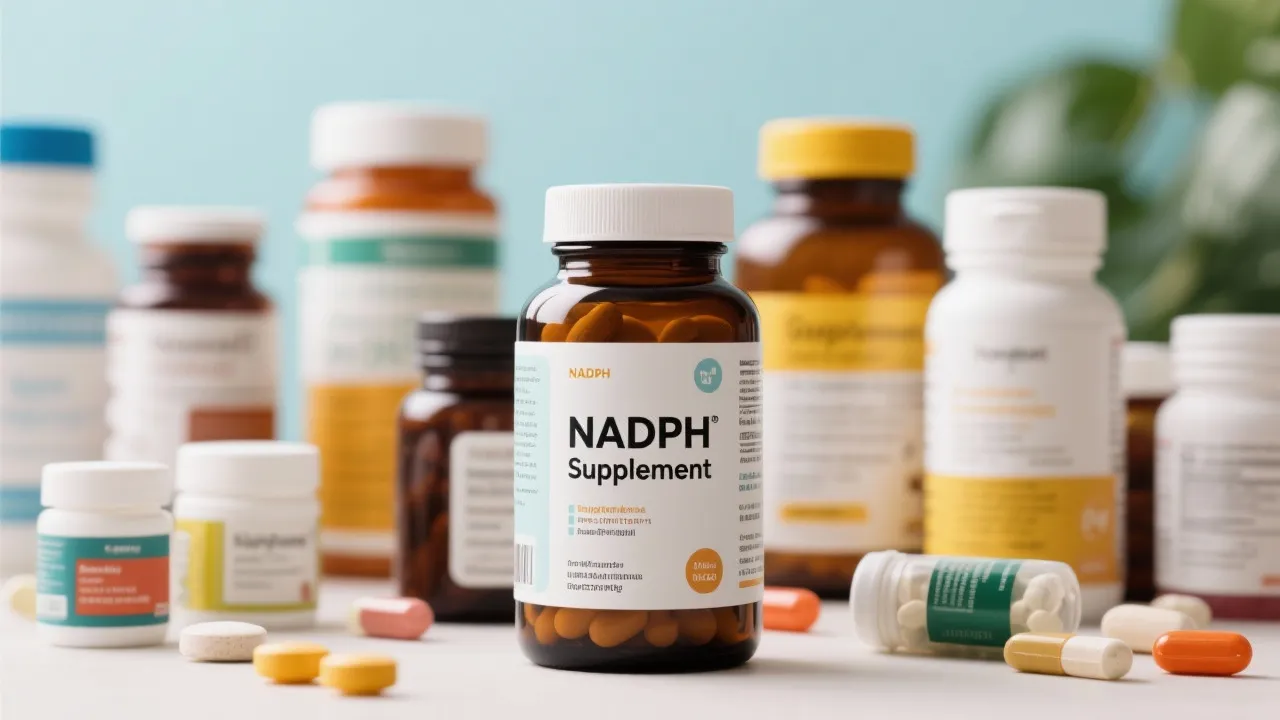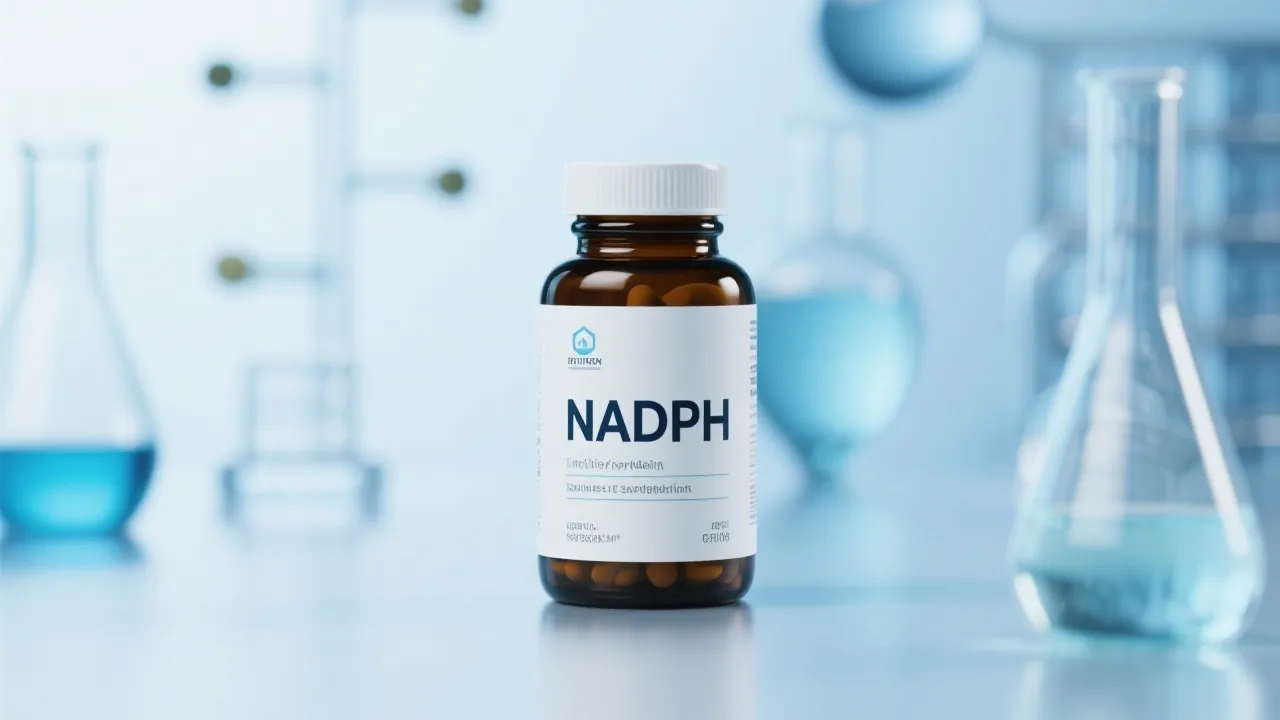The Benefits of NADPH Supplements
NADPH supplements are gaining attention for their potential health benefits, particularly in cellular energy production and reducing oxidative stress. Nicotinamide adenine dinucleotide phosphate (NADPH) plays crucial roles in biochemical processes. Understanding the importance and applications of these supplements can inform better health decisions.
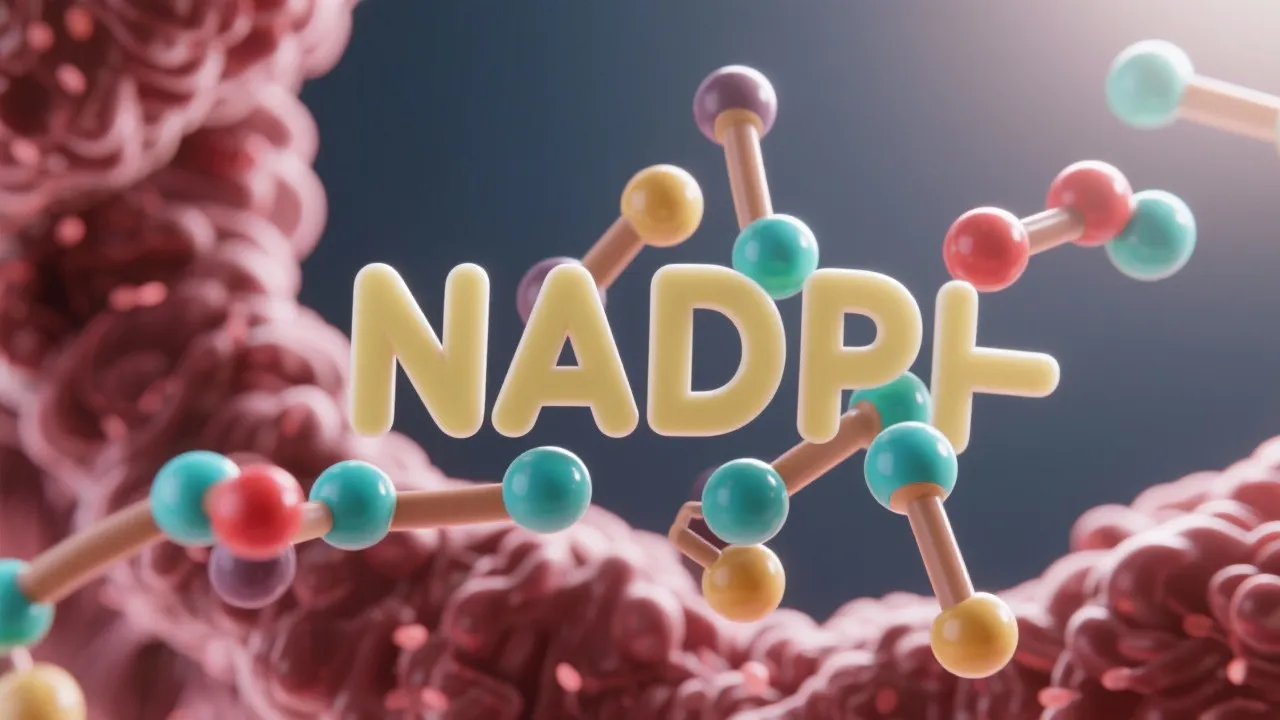
Understanding NADPH and Its Biological Importance
Nicotinamide adenine dinucleotide phosphate, or NADPH, is a critical cofactor found in all living cells, playing a pivotal role in a multitude of biological reactions. It primarily functions as a major electron donor in biosynthetic reactions, including fatty acid and nucleotide synthesis. Furthermore, NADPH is fundamental in some of the body's antioxidant systems, helping to mitigate oxidative stress by restoring antioxidants like glutathione. Its presence not only facilitates energy transfer but also ensures the proper functioning of various metabolic pathways, making it indispensable for cellular health and metabolic regulation.
Every cell utilizes NADPH for essential metabolic processes, such as the synthesis of biomolecules necessary for growth, repair, and maintenance. The interconnectedness of NADPH with other biochemical pathways showcases its versatility, especially in processes like glycolysis, the pentose phosphate pathway, and oxidative phosphorylation. The pentose phosphate pathway is particularly noteworthy, as it is the primary source of NADPH in cells, generating this cofactor through oxidative and non-oxidative phases. Understanding the production and utilization of NADPH could open doors for therapeutic innovations targeting metabolic diseases and aging.
Why Consider NADPH Supplements?
The growing interest in NADPH supplements stems from their potential therapeutic benefits. As the body ages or when it faces health challenges, the natural production and maintenance of NADPH levels can decline. Factors such as chronic stress, poor diet, and inadequate sleep can exacerbate this decline, leading to an increased risk of various diseases linked to oxidative stress and mitochondrial dysfunction.
Supplementation aims to bolster the body's capacity to manage oxidative stress and maintain energy balance. In particular, supplementation may benefit individuals experiencing higher oxidative stress due to lifestyle factors or age-related changes. As researchers continue to explore NADPH's roles, they have begun to identify specific populations that could greatly benefit from improving their NADPH levels. For example, athletes and individuals involved in intense physical training may find that supplementing with NADPH can enhance recovery and performance by improving oxidative stress management and energy production.
Mechanisms of Action: How NADPH Works
NADPH functions as a critical reducing agent in anabolic reactions, meaning it helps build larger molecules from smaller ones. This action is essential in various biosynthetic pathways. For instance, during fatty acid synthesis, NADPH donates electrons that facilitate the reduction of acyl chains. Similarly, in nucleotide synthesis, NADPH is vital for producing deoxyribonucleotides from ribonucleotides, critical for DNA replication and repair. This broad involvement in metabolic pathways underscores the indispensable nature of NADPH in maintaining overall cellular health.
Moreover, NADPH plays a crucial role in defending against oxidative damage by restoring antioxidant levels within cells. It assists enzymes like glutathione reductase, which maintain glutathione in its reduced form, essential for combatting oxidative stress. Conditions that deplete glutathione levels, such as chronic inflammation or exposure to environmental toxins, can contribute to a wide array of diseases, including neurodegenerative disorders and cardiovascular diseases. Thus, maintaining adequate NADPH levels is critical not only for metabolic processes but also for the body's defensive strategies against oxidative stress.
Health Benefits of NADPH Supplements
- Supporting Metabolic Pathways: NADPH is integral to numerous biosynthetic pathways. By supplementing NADPH, one can potentially enhance these metabolic routes, facilitating the effective production of vital biomolecules. This enhancement may lead to improved energy utilization, particularly under conditions where the body’s demand for energy increases, such as during intense exercise or recovery from illness.
- Antioxidant Protection: Given its central role in reducing oxidative stress, NADPH supplements may aid in replenishing the body's antioxidant defenses, thus protecting against cellular damage. Elevated NADPH levels can enhance the body’s capability to neutralize free radicals and reduce the risk of oxidative stress-related disorders.
- Potential Anti-Aging Effects: As the body's natural NADPH levels decline with age, supplementation might support improved energy metabolism and reduce age-related cellular deterioration. By promoting better cellular function and resilience, NADPH could help mitigate some common signs of aging, such as diminished stamina, increased fatigue, and slower recovery from injury.
- Improving Immune Function: NADPH is crucial for the proper functioning of immune cells, particularly those involved in innate immunity, such as macrophages and neutrophils. These cells rely on NADPH to generate reactive oxygen species (ROS) during the immune response to destroy pathogens effectively. Enhanced NADPH levels from supplementation might support a more robust immune response, especially during infections or immune challenges.
- Cardiovascular Health: NADPH's role in maintaining endothelial function and vascular health is gaining attention. Adequate levels can support nitric oxide synthesis, essential for vasodilation and maintaining proper blood pressure. By enhancing vascular function, NADPH may help reduce the risk of cardiovascular diseases.
Considerations for Supplementation
Before incorporating NADPH supplements into one’s health regimen, it’s important to consult a healthcare professional to ensure suitability, especially for individuals with underlying health conditions or those taking other medications. Despite its reported benefits, excessive intake without medical advice can lead to imbalances in cellular processes. Potential adverse effects, while generally mild, could occur, including gastrointestinal discomfort or fluctuations in blood sugar levels. Furthermore, understanding the specific needs of your body and monitoring supplementation effects through professional guidance can optimize the benefits of NADPH.
Additionally, individuals should consider lifestyle factors that influence NADPH levels, such as diet, exercise, and stress management. A well-balanced diet rich in antioxidants, vitamins, and minerals can significantly impact the body’s natural capacity to produce and maintain NADPH levels. Foods like leafy green vegetables, nuts, seeds, and lean proteins are known to provide nutrients supporting NADPH synthesis and metabolic health. Regular physical activity has also been shown to improve overall cellular function and foster a more favorable balance of oxidants and antioxidants.
Comparing NADPH Supplement Brands
| Brand | Feature | Benefit |
|---|---|---|
| Brand A | Vegan-friendly formula | Accessible for those on plant-based diets, ensuring dietary restrictions are honored while providing necessary nutrients. |
| Brand B | Addition of coenzyme Q10 | Enhanced antioxidant support, possibly improving cardiovascular health and energy production by synergizing with NADPH. |
| Brand C | Includes natural plant extracts | Aids absorption and efficacy, potentially increasing the bioavailability of NADPH for better cellular uptake. |
| Brand D | Time-release formula | Provides sustained release of NADPH throughout the day, which may enhance its effectiveness and support continuous energy and antioxidant defenses. |
| Brand E | Complimentary B vitamins | Supports overall metabolic health as B vitamins play a role in NADPH synthesis, working synergistically to optimize energy production. |
Frequently Asked Questions (FAQs)
- What is the recommended dosage of NADPH supplements? Consulting a healthcare provider is crucial as it can vary based on individual health needs and conditions. Factors such as age, physical activity level, and health goals may influence the appropriate dosage.
- Are there any side effects? Some individuals may experience minor gastrointestinal discomfort, but many tolerate it well. Always follow the guidance of a healthcare professional and report any unexpected symptoms during supplementation.
- Can NADPH supplements be combined with other supplements? While generally considered safe, it’s important to discuss with a healthcare provider to avoid any potential interactions with medications or other supplements, particularly those impacting metabolic processes.
- Is NADPH supplementation safe for pregnant or breastfeeding women? The safety of NADPH supplementation during pregnancy or lactation has not been extensively studied. Hence, it is advisable for pregnant or breastfeeding women to seek professional guidance before starting any new supplementation.
- How long does it take to see results from NADPH supplementation? Individual responses to NADPH supplementation may vary. Some users report feeling increased energy or improved recovery within a few days, while others may take weeks to experience notable benefits, depending on their health status and lifestyle.
Conclusion
NADPH supplements present a promising avenue for supporting metabolic health and reducing oxidative stress. As our understanding deepens, it becomes clear that maintaining adequate NADPH levels is not just about combating aging or enhancing physical performance but also about fostering overall cellular function and resilience. While the science continues to evolve, current studies suggest that maintaining sufficient NADPH levels could support cellular activities vital for overall health. For those considering supplementation, it remains essential to take an evidence-based approach, weighing the potential benefits against personal health needs and consulting with healthcare professionals.
In conclusion, the landscape of NADPH supplementation is rich with potential benefits but requires careful navigation. Those interested in boosting their NADPH levels should also take into account the holistic nature of health, encompassing diet, lifestyle, and emotional well-being in conjunction with any supplements. An integrated approach may yield the best outcomes in promoting health, vitality, and longevity.
